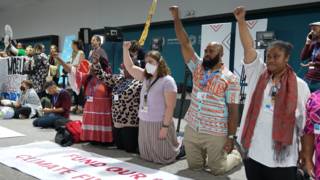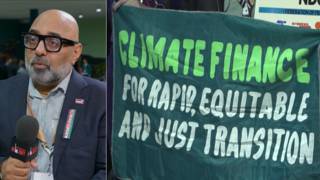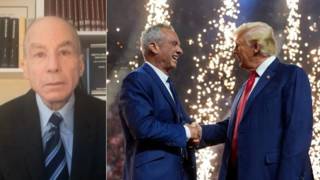
Related
Guests
- Francesca AlbaneseUnited Nations special rapporteur on the Occupied Palestinian Territories.
Francesca Albanese, United Nations special rapporteur on the Occupied Palestinian Territories, says the latest violence in Israel and Palestine has shocked even long-term observers of the conflict. She says Hamas atrocities cannot justify Israeli crimes in Gaza, where at least 3,300 people have been killed since Israel began pounding the territory with thousands of bombs. “What we are watching is a catastrophe of Olympian proportions,” says Albanese. “The only reasonable and necessary thing to ask for is an immediate and unconditional ceasefire, which of course must be also accompanied by the release of the civilian hostages that Hamas has taken.” She says the scale of Israel’s response cannot be considered proportional, and warns that the displacement of potentially millions of Palestinians from Gaza would constitute the “largest instance of ethnic cleansing in the history of this tormented land.”
Transcript
AMY GOODMAN: This is Democracy Now!, democracynow.org, The War and Peace Report. I’m Amy Goodman.
U.N. Secretary-General António Guterres has called for an immediate humanitarian ceasefire in Gaza. He spoke earlier today.
SECRETARY-GENERAL ANTÓNIO GUTERRES: Immediately before departing for Beijing, I made two urgent humanitarian appeals: to Hamas, for the immediate and unconditional release of the hostages; to Israel, to immediately allow unrestricted access of humanitarian aid to respond to the most basic needs of the people of Gaza, the overwhelming majority of whom are women and children. …
They cannot justify the acts of terror against civilians committed by Hamas on October 7 that I immediately condemned. But those attacks cannot justify the collective punishment of the Palestinian people.
Each of my two humanitarian appeals have a value in themselves. They are not bargaining chips. They are simply the right thing to do. And I am horrified by the hundreds of people killed at Al-Ahli Hospital this same day in Gaza by a strike that I strongly condemned earlier today. I call for an immediate humanitarian ceasefire to provide sufficient time and space to help realize my two appeals and to ease the epic human suffering we are witnessing. Too many lives and the fate of the entire region hang on the balance.
AMY GOODMAN: We’re joined right now by Francesca Albanese, the United Nations special rapporteur on the Occupied Palestinian Territories, speaking to us from Washington, D.C.
Thank you so much for being with us. Can you respond to what’s unfolding right now and to the U.N.’s call for a humanitarian ceasefire at this point, after the deaths of some more than 1,300 Israelis and over 3,300 Palestinians?
FRANCESCA ALBANESE: Good morning, Amy, and thank you for having me.
What we are watching is a catastrophe of Olympian proportions. It’s a humanitarian and political catastrophe. Since the very early hours of this new tragedy unfolding in the Occupied Palestinian Territory and Israel, I’ve unequivocally condemned what Hamas has done, its targeting of innocent civilians, its taking hostages, and at the same time, in the same breath, I have condemned the response that has been given by Israel under the pretense of — under the pretext of self-defense, and brutal, even unprecedented attacks in terms of intensity, against a population which has suffered, in the Gaza Strip alone, five major wars over less than 15 years. So, I’ve said, how the killing of 3,000 civilians, the bombing of hospitals, schools, crowded markets, the leveling of houses — how can it ever be justified as self-defense?
And amidst all this, I’ve said the only reasonable and necessary thing to ask for is an immediate and unconditional ceasefire, which of course must be also accompanied by the release of the civilian hostages that Hamas has taken. There is no way out without a peaceful solution. And it’s important, it’s imperative for the international community and the U.S., first and foremost, to take this opportunity to act evenhandedly and with wisdom, before we spiral further into abyss, because this is what is going to happen if the situation does not deescalate.
AMY GOODMAN: Spiraling into an abyss. Francesca Albanese, if you could respond first to what happened on October 7th, the surprise Hamas attack that ultimately killed more than 1,300 Israelis? Now we believe roughly 200 to 250, according to them, additional people are being held hostage in Gaza. And then if you can respond to the plans of Israel — repeatedly what is said is they want to de-Hamasify Gaza — and what that means?
FRANCESCA ALBANESE: What has happened since the 7th of October is, as I said, unconscionable, has taken everyone, even longtime observers of the situation in Israel-occupied Palestinian territory, by surprise. There is no way that what Hamas has done cannot be condemned as war crimes and possible crimes against humanity, with no prejudice to an investigation that needs to be conducted. And there is already an investigation ongoing by the Commission of Inquiry on the Occupied Palestinian Territory and Israel. As I said, killing civilians and taking civilian hostages cannot be ever justified. Civilian life must be preserved at all times, under all circumstances. And, you know, if we put this in context from a Palestinian perspective, the Palestinians have been under an oppressive regime, a settler colonial regime in the Occupied Palestinian Territory, which is apartheid by default, for decades now. But so, while resisting the occupation, resisting this oppression is a legitimate goal under international law, it doesn’t give blanket license to kill or to target civilians. So, resistance has rules as much as — like the conduct of the occupied power — I mean Israel — has rules. And I cannot think of one rule of international humanitarian law that has not been violated. So, this is clear.
Now, going to Israel’s response, well, there is the opaqueness of declaring wanting Israel — Israel wants to uproot, eradicate Hamas from the Gaza Strip. We have to remember that the Gaza Strip has been under an unlawful blockade for 16 years. And it was already on the brink of humanitarian collapse, according to many sources, primarily the United Nations, other international organizations, even before the 7th of October. And what has happened is an intensification of this unlawfulness, because the blockade has been further tightened by declaring — by cutting off the Gaza Strip from receiving water, electricity, food, essential medicines, while it was also being bombed. I cannot imagine how this can on Earth be considered proportionate, proportional. And again, all this violence, all this brutality unleashed against 2.2 million people, half of whom are children, how can it lead, on the one hand, to the eradication of Hamas or to the, let’s say, the deescalation of the tension among the Palestinian people in Gaza?
And there is another element here, which you rightly pointed to, which is the intent to move out — I mean, to eradicate Hamas, but also to move out Palestinians from the Gaza Strip. As I myself denounce, there is a risk of ethnic cleansing here. And it wouldn’t be the first time. And there is both a declared intent, because there have been countless statements by Israeli leaders wanting to push the people of Gaza out into the Sinai, and there is also the practice. Under the fog of war, mass displacement of Palestinians has occurred — in 1947, '49, when 750,000 Palestinians were displaced, made refugees, and never allowed to return; in 1967, when 350,000 Palestinians were displaced, made refugees, many of them anew, for the second time, and never allowed to return. So, what is happening now, it's targeting millions of Palestinians. So it would be the largest instance of ethnic cleansing in the history of this tormented land. And it’s not possible that it happens under the watch of the international community.
AMY GOODMAN: So, if you can talk about the rejection of the U.N. Security Council draft resolution calling for a humanitarian ceasefire in Gaza? The resolution was introduced Monday. It was introduced by Russia, won the support of Gabon, Mozambique, the United Arab Emirates and China. Six countries abstained. France, Japan, the United Kingdom and the United States voted against the ceasefire resolution.
FRANCESCA ALBANESE: Amy, it’s not a coincidence that I started this interview by saying this is a catastrophe of humanitarian and political Olympian proportion. We can see the failure of the United Nations system to ensure peace and security now, because the fact that the U.N. Security Council has so far been unable to issue a strong condemnation of what’s happening, of what has been committed by Hamas and what is being committed by Israel. This is, again, symptomatic of a decadelong political failure to resolve a situation that has been transformed into a humanitarian emergency and humanitarian catastrophe. But it remains a political — a political — situation that needs to be resolved in line with international law. And it’s upon the United Nations Security Council to do so. As I said, this is a critical time to show compassion and to show solidarity with both the Israelis and the Palestinians and act evenhandedly.
AMY GOODMAN: I wanted to ask you about the news that Israel is set to ban Al Jazeera from reporting in the Occupied Territories, after the attorney general approved the move. According to the Israeli media, the attorney general, Gali Baharav Miara, and communications minister, Shlomo Karhi, reached an agreement Tuesday on the wording of emergency regulations to stop Al Jazeera from operating. Francesca Albanese, what does this mean? I mean, here in the United States — and you’re not always here, to say the least, but in this country, the news we are getting from the corporate media, when it comes to the broadcast and cable networks, there is almost no one reporting regularly from inside Gaza. Al Jazeera does report on the ground in Gaza. The significance of this?
FRANCESCA ALBANESE: I have to say, I learned this now. I hadn’t heard of it yet. And it’s extremely worrisome, because, again, we need information. We need information so that — I mean, everyone, the public opinion, and, all the more, political leaders. There have been very few independent voices reporting from Gaza, let alone after the 7th of October. But Al Jazeera has been an incredible source of information. So it’s incredible that this is happening. At the same time, what I want to point to is that both Palestinian and Israeli human rights organizations have done an incredible job over the years, and including these days in these tragic hours for both, to report and also put in context what’s happening. So I do hope that the decision to expel Al Jazeera will be repealed. And this will put even more onus —
AMY GOODMAN: Well, it hasn’t happened yet, but they’re on the verge, it sounds like.
FRANCESCA ALBANESE: It shouldn’t happen. It shouldn’t happen. And this is all the more — it makes all the more necessary for the international community, individual member states to prevent this from happening.
AMY GOODMAN: Well, Francesca Albanese, we want to thank you so much for being with us, United Nations special rapporteur on the Occupied Palestinian Territories.












Media Options